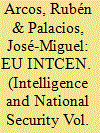| Srl | Item |
| 1 |
ID:
173962


|
|
|
|
|
| Summary/Abstract |
This article aims to gain a better understanding of EU INTCEN’s analytic culture and the use of structured analytic techniques by EU analysts; an under researched topic in the intelligence studies literature. The Intelligence Analysis and Situation Centre of the European Union (EU INTCEN) is a directorate of the European Union External Action Service (EEAS) that has been characterized as an EU analytic structure similar to the State Department’s INR. The article reviews relevant literature and presents findings based on the analysis of a questionnaire on ‘Intelligence analysis and production in EU INTCEN/SITCEN, that was distributed to EU INTCEN intelligence analysts (EEAS officials having worked as analysts in EU SITCEN/INTCEN between June 2005 and June 2014), and in-depth phone interviews to better understand INTCEN analytical process. Analytic projects at EU INTCEN are initiated with Requests for Information to which replies can be received. The analysts count as well with previous contributions and assessments, open sources, and diplomatic reporting. Among other findings, the study reveals that SATs are little used in practice in spite of most EU INTCEN analyst has received some training on SATs.
|
|
|
|
|
|
|
|
|
|
|
|
|
|
|
|
| 2 |
ID:
155217


|
|
|
|
|
| Summary/Abstract |
This article discusses the use of experiential (or active) learning methods – specifically the use of simulations, exercises, and games – to enhance student learning in intelligence courses at universities to prepare students for careers in intelligence organizations. The article argues that most disciplines and academic fields employ laboratories, simulations, internships, and practical exercises when the learning objective is to develop the required skills to successfully practice a professional discipline. The use of active learning techniques challenges prospective intelligence professionals to learn by exercising previously learned concepts, frameworks, and tools in simulated ‘real world’ scenarios, leading them to gradually become more technically skillful and effective.
|
|
|
|
|
|
|
|
|
|
|
|
|
|
|
|
| 3 |
ID:
159938


|
|
|
|
|
| Summary/Abstract |
This article examines the 2007 EU all-source intelligence assessment ‘Worst Case Scenarios for the Narrower Middle East’ and the lack of policy response to the warning provided. SIT-6577/07 mostly predicted and provided forewarning on some of the events lately known as the Arab Spring, as well as a rise of anti-European terrorism, and an increase of refugees and migrants in the European Union. The article offers a post-mortem analysis of the key judgements and main findings of the most significant intelligence product declassified by the EU and discusses the main question: Why the warning was not effective?
|
|
|
|
|
|
|
|
|
|
|
|
|
|
|
|